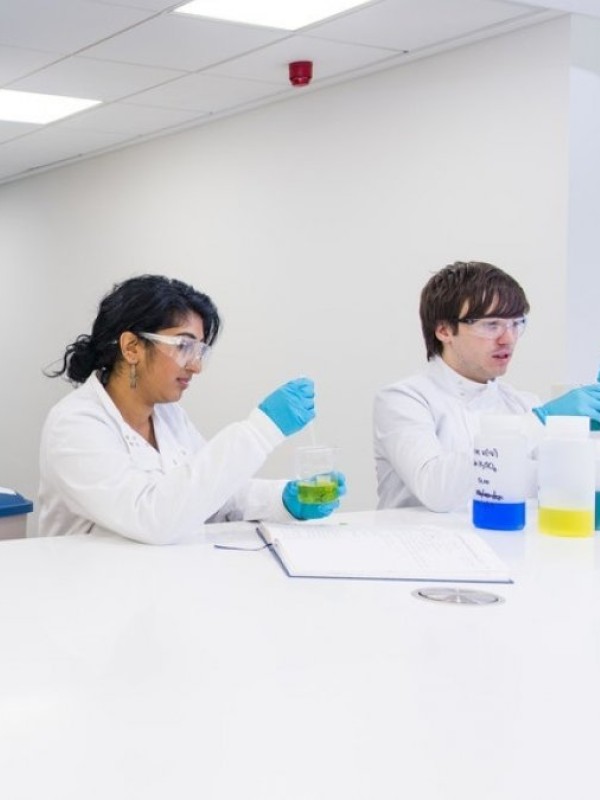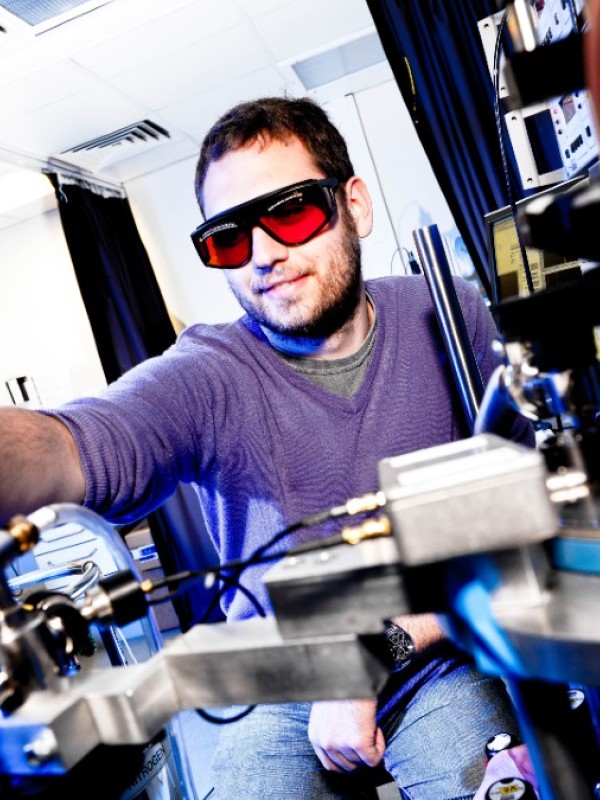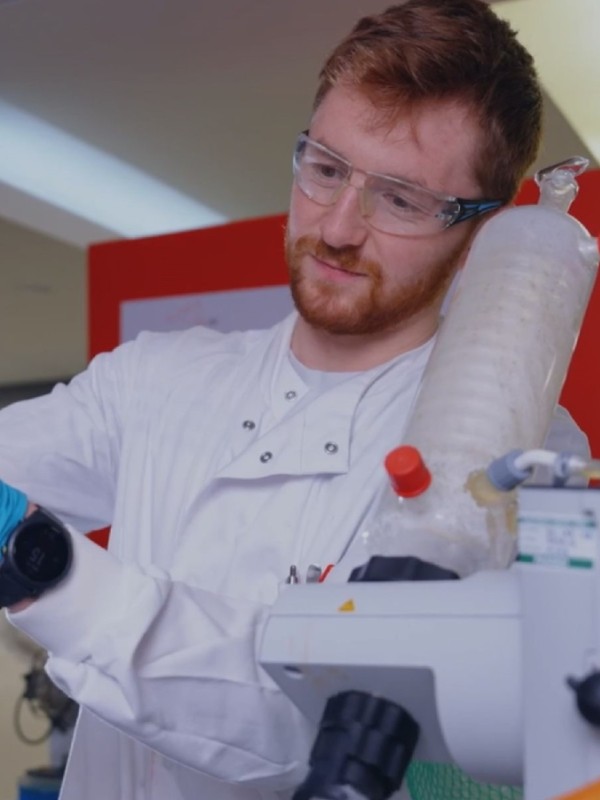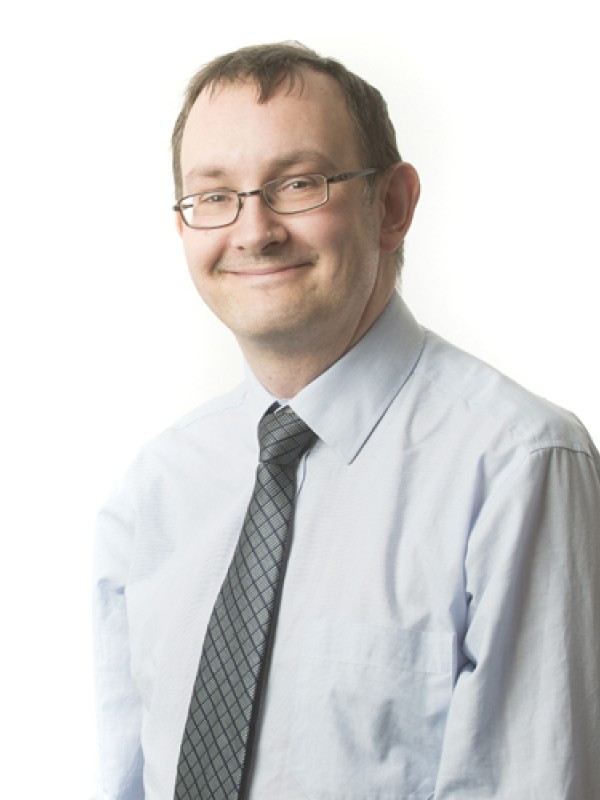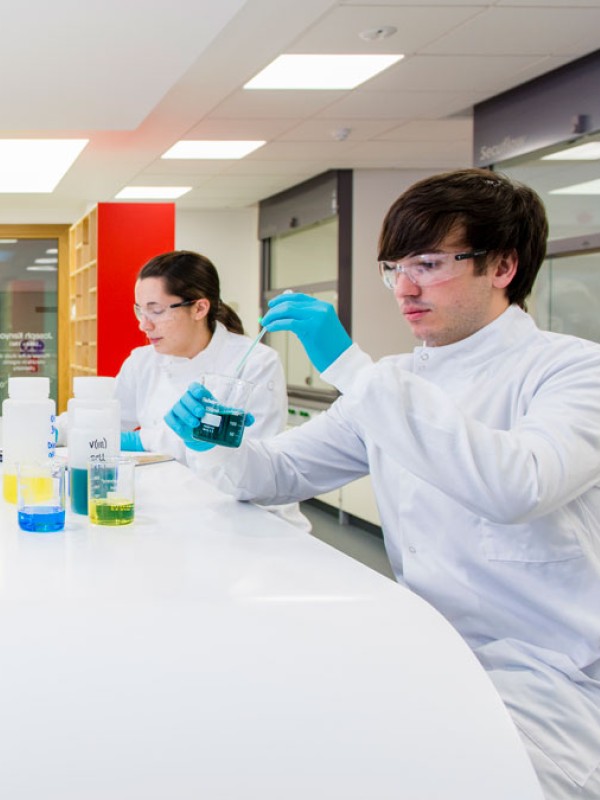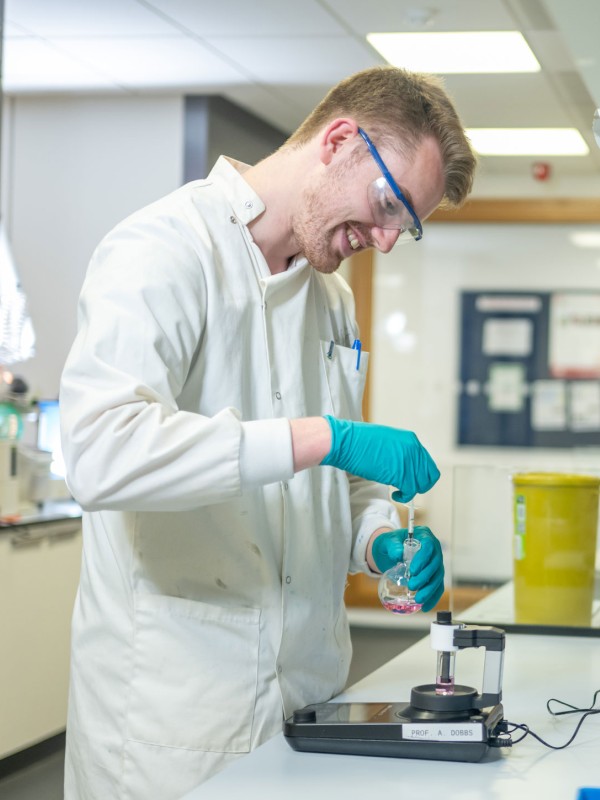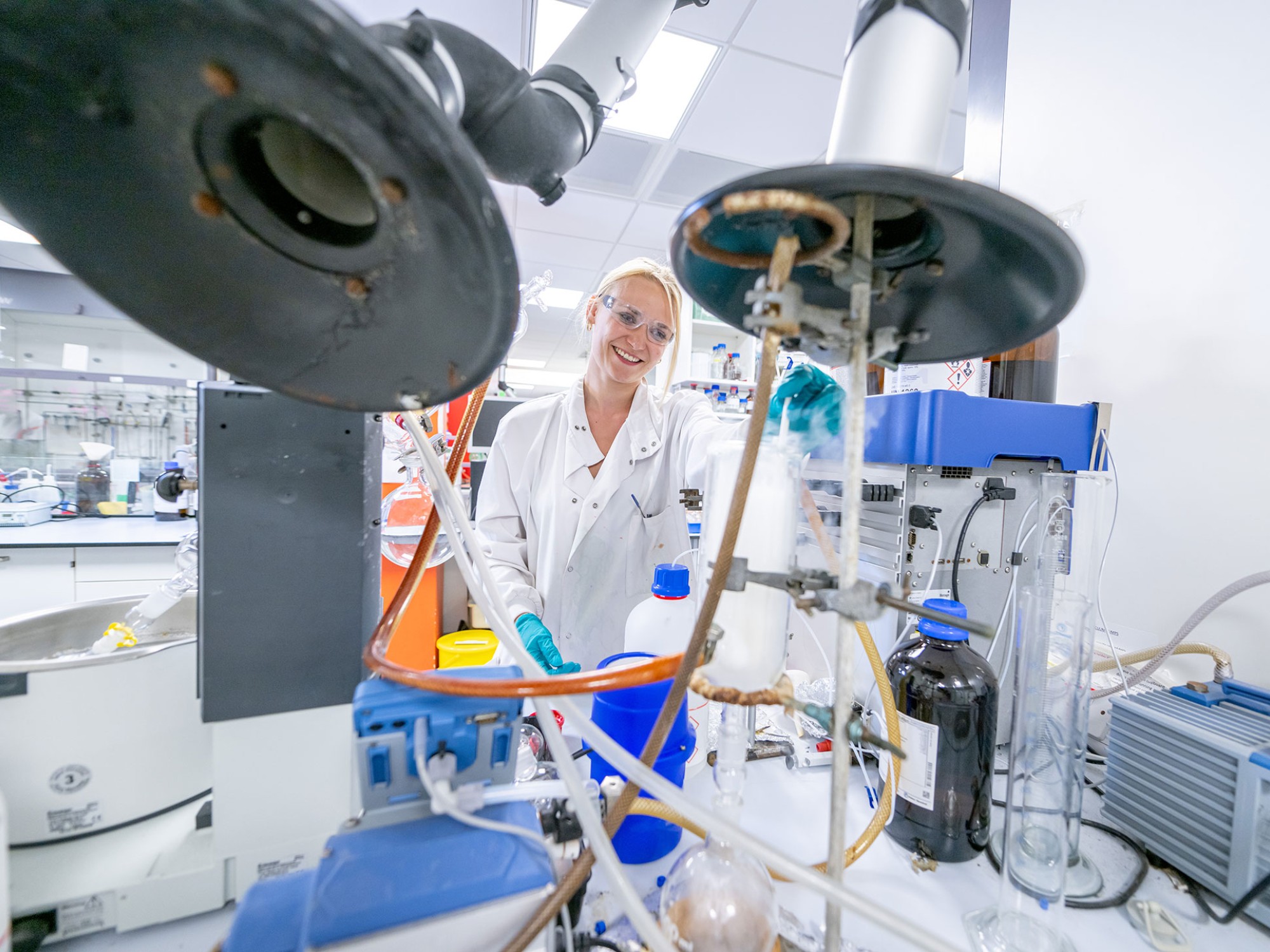
- Chemistry
BSc (Hons) or MChem — 2025 entry Chemistry
Our Chemistry degrees prepare you for a variety of exciting and interesting careers including scientist, researcher, writer and teacher. Through hands-on "learning by doing" you'll get access to innovative research facilities and invaluable industry placement opportunities.
Why choose
this course?
- Our accredited chemistry degrees combine modern, practical chemistry with core theory. You'll have the opportunity to explore topics including computer modelling, forensic chemistry, environmental chemistry and topics in energy
- Take the opportunity to get industry-ready with our award-winning Professional Training placements, where you can work in one of our partner laboratories, in the UK or abroad
- Choose our integrated masters pathway where you’ll spend a year conducting independent research
- Learn from lecturers who are active researchers, whose work is used by governments, health professionals and industry
- Become part of a supportive community with one of the best staff-to-student ratios in the country.
Statistics
£33K
Average starting salary for Surrey chemistry and chemistry related degree graduates (Graduate Outcomes 2024, HESA)
11th in the UK
The University of Surrey is ranked 11th for overall student satisfaction* in the National Student Survey 2024
*Measured by % positivity based on Q1-24 for all institutions listed in the Guardian University Guide league tables.
Accreditation
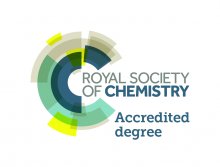
What you will study
During your first two years, you’ll develop a broad understanding of chemistry, its methodology and some of its most intriguing applications. You’ll study a range of modules in topics such as computer modelling, materials, data analysis and visualisation alongside four fundamental core chemistry topics.
In your final year, you will have the opportunity to specialise in a range of optional modules such as polymers or medicinal chemistry. You'll also complete a research project, bringing together all the practical, analytical and presentation skills you’ve developed.
If you choose to complete an integrated masters degree your placement year will be lab-based and research-focused while you also complete distance learning. You will experience advanced techniques in chemistry and you’ll enhance your scientific communication skills. During your final year of both bachelor's and master's degrees, you'll be embedded in a research group, working alongside an academic to carry out independent research. Example topics include drug design, materials for pollution control, catalysis, biodegradable polymers, monitoring microplastics and investigating novel data storage devices.
Professional recognition
BSc (Hons) - Royal Society of Chemistry (RSC)
Accredited by the Royal Society of Chemistry for partially meeting the academic criteria for Chartered Chemist (CChem).
MChem - Royal Society of Chemistry (RSC)
Accredited by the Royal Society of Chemistry for fully meeting the academic criteria for Chartered Chemist (CChem).
Foundation year
If you don’t meet our entry requirements, you might still be able to apply for this degree with a Chemistry Foundation Year. This is an extra year of study to develop your skills and make it easier for you to get started at university. On successful completion of your foundation year, you’ll be ready to progress to the first year of your degree.
To see what modules you’ll be studying, refer to the foundation tab in the 'Course structure' section.
The academic year is divided into two semesters of 15 weeks each. Each semester consists of a period of teaching, revision/directed learning and assessment. Details on how your chemistry degree modules fit into this structure are below.
The structure of our programmes follow clear educational aims that are tailored to each programme. These are all outlined in the programme specifications which include further details such as the learning outcomes.
- Chemistry BSc (Hons)
- Chemistry BSc (Hons) with foundation year
- Chemistry BSc (Hons) with placement
- Chemistry BSc (Hons) with foundation year and placement
- Chemistry MChem
Please note: The full module listing for the optional Professional Training placement part of your course is available in the relevant programme specification.
Modules
Modules listed are indicative, reflecting the information available at the time of publication. Modules are subject to teaching availability, student demand and/or class size caps.
The University operates a credit framework for all taught programmes based on a 15-credit tariff.
Course options
Year 1 - BSc (Hons)
Semester 1
Compulsory
The module provides an introductory overview of the main techniques used in analytical chemistry. It provides understanding of the fundamental principles of chemical analysis as well as the main aspects of their application. The combination of lectures and practical sessions allows the students to get familiarised with the common practices in an analytical chemistry laboratory (calibration of instrumentation, validation, analysis of quality control samples, etc.) as well to introduce them to health & safety regulations and risk assessment.
View full module detailsThis module provides an introduction to Inorganic Chemistry and contains both theoretical and laboratory components. The starting point is basic quantum theory which is built upon to explain the periodic table, key trends and the reactivity of main group and d-block elements. This is underpinned by a review and extension of bonding theories.
View full module detailsThis module introduces key skills in: Mathematics: for the manipulation of physical laws underpinning Chemistry Statistics: for analysis and significance testing of hypotheses and analytical data in Chemistry Computing skills: for the basics of molecular modelling and presentation of chemical information in a standard format These skills are essential for your understanding of concepts later in the degree program, as well as in the handling of chemical data particularly in the laboratory aspects of all future CHE modules.
View full module detailsOptional
The purpose of this module is to give students a fundamental understanding of the conceptual frameworks underpinning forensic science. In this first-year module a very wide array of evidence types are covered. Casework examples are used to give students a broad understanding of how forensic evidence is retrieved, packaged, analysed and reported in court. This module interacts with material that students are taught through analytical chemistry modules and demonstrates the application of relevant techniques to forensic casework. This module supports further learning across all chemistry programmes it features in. Particular relevance can be found in the following modules. CHE1044 (General principles of analytical chemistry) CHE2035, CHEM038, CHE3066 (analytical problem solving, instrumental techniques) CHE3055, CHEM034 (Forensic toxicology, forensic investigation) CHEM037, CHE3062 (principles of pharmacokinetics, drug processes, schedules)
View full module detailsThis module is intended to introduce basic data handling knowledge and practice combined with introductory programming skills (digital capabilities) to give students confidence in handling chemical data which they can apply to all modules throughout the course (resourcefulness and resilience) and will also provide a basis for future employment (not only in chemistry) where they will need these skills generally (employability). The hands-on workshop approach rather than formal lectures gives them the chance to solve set problems whilst building their confidence.
View full module detailsSemester 2
Compulsory
This module gives an introduction to organic chemistry based on an orbital approach to structure and bonding, then a structure and bonding approach to reactivity, followed by the application of structure, bonding and reactivity to simple functional group organic chemistry. A practical component will teach basic organic laboratory skills and allow students real-life experience of carrying out some of the chemistry taught in the lectures.
View full module detailsThis module gives an introduction to fundamental laws that govern the behaviour of matter through an understanding of the properties of matter at molecular, atomic and subatomic level. This will in some cases build on your existing knowledge (e.g. atomic structure gained in CHE1042, or pre-university knowledge in thermodynamics), and in others introduces you to new knowledge essential for the understanding of later concepts in Physical Chemistry such as in CHE2040.
View full module detailsThis module provides the opportunity to enhance transferable skills including skills necessary for employment and further study. Specifically, students will learn about the principles of scientific writing/reporting, how to research using scientific databases and how to reference content appropriately. Students will gain skills in Excel to visualise data, graphing and statistical functionality for chemical problems, and develop individual presentation skills.
View full module detailsThe module provides an overview of the industrial production of major chemicals at the larger scale, and their use in society. This includes aspects of chemical processes including economics, societal effects, health and safety, and engineering. The module also introduces the numerous interlinked chemical processes, both natural and anthropogenic, that take place within the Earth¿s environment. This includes coverage of the impact they may have for life on Earth along with potential solutions to current environmental issues.
View full module detailsOptional modules for Year 1 - FHEQ Level 4
Choose 1 from 2
(CHE1046 Data Analysis OR CHE1039 Fundamentals of Forensic Science from Crime scene to Court)
.
Year 2 - BSc (Hons)
Semester 1
Compulsory
This module builds upon the basic concepts taught at FHEQ level 4 and prepares students for the advanced research-led concepts of FHEQ level 6 and, where applicable, for relevant placements. Specifically, new reactions leading to carbon–carbon bond formation are explained, while the concepts of aromatic chemistry are expanded to heteroaromatics.
View full module detailsThis module discusses the theoretical knowledge and skills required for the interpretation of NMR, IR, Raman, MS and UV-Vis spectra
View full module detailsEnhancing a knowledge and application of analytical chemistry including an awareness of the operation of modern instruments in research and industrial environments.
View full module detailsThe students will gain understanding of the fundamental concepts behind materials involving extended inorganic and organic structures, along with their properties and applications (encompassing Sustainability and Global and Cultural Capabilities pillars). This includes an introduction to characterisation techniques that are more specific to materials chemistry (e.g. diffraction techniques, thermal analysis, mechanical testing, and characterisation of magnetic and conduction properties) compared to small molecule chemistry.
View full module detailsSemester 2
Compulsory
This module builds on concepts introduced at level 4 to inform, analyse and stimulate enquiry into Intermediate topics in Physical Chemistry. The student will learn fundamental and applied aspects of phases and equilibria, spectroscopy, surfactants, colloids and emulsions and gain hands-on experience of a range of experimental techniques that reinforce the learning outcomes of the module.
View full module detailsThis module builds on knowledge from the Inorganic Chemistry module at level 4 and expands on the principles of bonding and reactivity to include p-, d-, and f-block elements and gives students an introduction to molecular symmetry. The associated laboratory component further develops skills in the synthesis and characterisation of inorganic compounds.
View full module detailsOptional
This module builds on general organic chemistry principles that students acquired at levels 4 and 5 in the context of biomolecules. Students will learn the natural and synthetic chemistry of peptides, proteins, carbohydrates, nucleic acids and natural products from common biosynthetic pathways. This foundation will then support development of a basic understanding of drug action, on and by these molecules, and the drug discovery process.
View full module detailsThis module is intended to further develop knowledge and practice of Molecular modelling (started in module CHE1040) and introduce the students to modern computational drug design, molecular dynamics and programming as an opportunity to gain these skills on their own but also as a precursor to the CHE3053 module in the final year where more advanced aspects of these techniques will be developed. The module also serves to help students gain skills and experience that they may want to develop further in the final year project modules (CHE3047 and CHEM029)
View full module detailsThe purpose of this module is to give students a fundamental understanding of forensic chemistry. Rather than concentrate on chemistry per se, the focus is on the principles of chemistry as they relate to specific evidence types, namely gunshot residue, explosives, drugs and toxicology, paint and glass. Casework examples will be used to give students a broad understanding of how data is interpreted. This module demonstrates the application of relevant techniques to forensic casework. This module supports further learning across all chemistry programmes it features in. Particular relevance can be found in the following modules. CHE2035, CHEM038, CHE3066 (analytical problem solving, instrumental techniques) CHE3055 (forensic toxicology, forensic investigation) CHEM034 (forensic toxicology, analysis of trace evidence) CHEM037, CHE3062 (principles of pharmacokinetics, drug processes, schedules)
View full module detailsThis is an optional Level-5 that provides fundamental knowledge on the Principles of Radiochemistry. It complements some of the knowledge provided in compulsory Physical chemistry and Analytical Chemistry modules for all Chemistry Programs, as well as giving some ground knowledge to students following the Medicinal Chemistry program, interested in pharmacological development and production. The module introduces students to the basic principles of radiochemistry, including nuclear stability and the nature of radioactive decay. Emphasis will be placed on methods for the measurement of radioactive isotopes together with the radiochemical separation techniques required for sample preparation. The concept of radiological dose, which forms the basis of radiological protection, will be covered in both the lectures and practical sessions.
View full module detailsOptional modules for Year 2 - FHEQ Level 5
Choose 2 from 4
(CHE2041 Principles of Radiochemistry, CHE2033 Forensic Chemistry, CHE2043 Computer Modelling in Chemistry OR CHE2037 Bioorganic Chemistry and Drug Discovery)
Year 3 - BSc (Hons)
Semester 1
Compulsory
This module builds on fundamental concepts introduced to students in Level 4 (CHE1041 Organic Structure, Reactivity and Functional Groups) and Level 5 (CHE 2044 Organic carbon-carbon bond formation and Heterocyclic Chemistry) organic chemistry courses and Level 5 Spectroscopy module (CHE2036 Applied Organic Spectroscopy). This is a high level module in organic chemistry, moving from the predominantly functional group approach of Level 4 beyond the skeletal construction approach of Level 5, to deal with modern and more conceptually challenging reactions and strategies for dealing with multistep syntheses. These are the reactions that are commonly used in contemporary organic synthetic chemistry.
View full module detailsThe module builds upon knowledge from Inorganic modules at level 4 and 5. This is achieved by introducing aspects of inorganic chemistry that have not been previously addressed or by reviewing and expanding knowledge towards applications. The main topic of the module is the bonding and reactivity of Organometallic compounds and the application of Organometallic d-block compounds in homogeneous catalysis. The application of group theory to the prediction and analysis of vibrational spectra of carbonyl complexes, is introduced. This expands on previous knowledge that a student gains at level 5 concerning point groups and molecular symmetry. To compliment applications of Organometallic compounds, the applications of Inorganic materials will be emphasized by detailed discussion of the operating mechanism and uses of silicon-based and molecular-based electronics. A current ‘hot topic’ in Inorganic materials research is considered: for example, the chemistry, properties and prospective uses of metal-organic frameworks or perovskites.
View full module detailsOptional
This module is intended to present advanced molecular modelling (building on previous modeling experience in CHE1040 and CHE2043) to give students experience with modern computational chemistry and data science applied to chemistry research. We will cover most aspects of modern computational chemistry from a practical viewpoint, where students learn by doing and not by just listening. If you are doing a computational final year project in CHE3047 or CHEM029 this module will give you the skills needed.
View full module detailsThe purpose of this module is to give students a detailed knowledge of specific topics within forensic investigation. In this final year module, the implications of DNA, fingerprints, toxicology, body fluids and forensic toxicology evidence are dealt with in the context of a forensic investigation. Casework examples are used to give students a broad understanding of how data is interpreted. This module demonstrates the application of relevant techniques to forensic casework and how evidence of these types is presented within the criminal justice system. This module supports further learning across all chemistry programmes it features in. Particular relevance can be found in the following modules: CHE3055 (Forensic toxicology, forensic investigation) CHEM037, CHE3062 (principles of pharmacokinetics, drug processes, schedules)
View full module detailsSemester 2
Compulsory
This module builds on levels 4 and 5 (physical chemistry, spectroscopy, inorganic modules and maths) to inform, analyse and stimulate enquiry into Physical Chemistry research in problems of relevance to industry and the environment. It features green chemistry, catalysis, surface science, advanced spectroscopy and photochemistry.
View full module detailsOptional
This is an optional module for students who wish to explore the vast and topical field of polymer technologies. This module builds upon the basic polymer concepts provided at Level-5 (especially CHE2038 Materials Chemistry: Fundamentals to Application). The module will provide an overview of advanced synthetic methods, complex polymer configurations and morphologies, and polymers and composite materials that are used in more advanced technologies (including multidisciplinary overlaps with engineering disciplines including aerospace and clean energy technologies).
View full module detailsThe purpose of this module is to give students an advanced understanding of Analytical chemistry. The student will enhance the knowledge and application of specialist topics in analytical chemistry including awareness of the operation of advanced modern instruments with particular attention to the principles, practical aspects and problem solving/application aspects of advanced atomic spectroscopy, chromatography, electrochemistry, and mass spectrometry. Case scenario examples will be used to give students a broad understanding of how data are produced and interpreted. This module demonstrates the application of relevant techniques to a wide range of application such as Environmental chemistry, geoscience, ecotoxicology, medical sciences. This module support further learning across all chemistry programmes such as: CHE1034 (basic knowledge for Chemistry of the Environment) CHE1044, CHE2035, CHEM028 (From fundamental to advance analytical chemistry modules) CHE2033, CHE3055, CHEM034 (Forensic toxicology/investigation, analysis of trace evidence) CHEM037, CHE3062 (principles of pharmacokinetics, drug processes, schedules)
View full module detailsThe module provides well-rounded knowledge and understanding of the chemistry and molecular considerations and assays involved in drug discovery. Students who opted to study Bioorganic Chemistry and Drug Discovery at level 5 will find this module gives a deeper understanding of the medicinal chemistry aspect of drug discovery. Through its employment of example drug discovery projects from the research areas of viruses, antibiotics, diabetes, adrenergic receptors, cancer, including nuclear medicine, nanotherapeutics and inorganic medicinal chemistry, it provides students with an appreciation of design and discovery strategies which will allow them to critically evaluate unseen medicinal chemistry projects as well as suggest new research directions and ideas for improvements.
View full module detailsSemester 1 & 2
Compulsory
The project module is the culmination of your learning journey so far. Here you will be able to put into practice the theory and practical skills you have learned throughout the course. You will also be able to employ your transferrable skills in the oral examination and the dissertation. This module is intended allow final year students to put all their knowledge learned so far to use in an extended practical project. Students work in the research groups of one of the academic staff and carry out independent research leading to the production of a dissertation which is also defended by an oral examination.
View full module detailsOptional modules for Year 3 - FHEQ Level 6
Choose 2 from 4
(CHE3053 Topics in Computer Modelling, CHE3055 Topics in Forensics Chemistry, CHE3062 Medicinal Chemistry OR CHE3066 Method Development and Applications in Analytical Chemistry)
BSc (Hons) with foundation year
Semester 1
Compulsory
This module provides opportunities for you to develop and demonstrate knowledge and comprehension, practical and core skills and reasoned judgements in familiar and unfamiliar chemistry and chemistry-related contexts. You will take responsibility for initiating and completing tasks and procedures, with classes in place to help support you. The module uses a combination of teaching strategies that encompass cross discipline learning, reflection on outcomes, self-guided research, and traditional lecture teaching. A synoptic assessment of the assimilation of knowledge is used, to examine your understanding across the main strands of study in the module. The content starts from a basic, general overview of the main strands of chemistry before diverging into more specific, in-depth topics towards the end of the course.
View full module detailsThis mathematics module is designed to reinforce and broaden basic A-Level mathematics material, develop problem solving skills and prepare students for the more advanced mathematical concepts and problem-solving scenarios in the semester 2 modules.The priority is to develop the students’ ability to solve real- world problems in a confident manner. The concepts delivered on this module reflect the skills and knowledge required to understand the physical around us. This is vital as mathematics plays a critical role in the students’ future employability and achievement on their respective undergraduate choices.
View full module detailsThis module introduces several principles and processes which underpin most physical science and engineering disciplines, which you are likely to study beyond the Foundation Year. Specifically, you will study topics that include S.I. units and measurement theory, electric and magnetic fields and their interactions, the properties of ideal gases, heat transfer and thermodynamics, fluid statics and dynamics, and engineering instrumentation and measurement. You will attend several lectures and a tutorial each teaching week alongside guided independent study opportunities to develop your understanding of topics more deeply, supported by the use of the university’s virtual learning platform.
View full module detailsSemester 2
Compulsory
This module provides opportunities for students to develop and demonstrate knowledge and comprehension, practical and core skills and reasoned judgements in familiar and unfamiliar chemistry and biology contexts. It follows on from ¿Foundational Chemistry¿, further reinforcing the skills learnt in the first semester module, whilst also supporting the adjacent module, ¿Advanced Chemistry¿, by providing laboratory content that complements the chemistry teaching. Biology content is taught and discussed with topics chosen to support a chemistry degree, and throughout the semester, a group project is carried out by the students, culminating in a group presentation. This module will use a combination of teaching strategies that encompass cross discipline learning, reflection on outcomes, self-guided research, and traditional lecture teaching.
View full module detailsThis module provides opportunities for students to develop and demonstrate knowledge and comprehension in familiar and unfamiliar chemistry and chemistry-related contexts. It follows on from ¿Foundational Chemistry¿ in semester 1, further reinforcing the skills learnt in the module, whilst going further into the chemistry content. Here the basic content from semester 1 is further built upon, introducing more in-depth topics of organic, physical, inorganic, and analytical chemistry. This module is supported by ¿Applied Chemistry and Biology¿, whereby laboratory sessions will take place, that relate to the content in this module. This module will use a combination of teaching strategies that encompass cross discipline learning, reflection on outcomes, and traditional lecture teaching.
View full module detailsOptional modules for Foundation - FHEQ Level 3
No options. For further information relating to FHEQ levels 4, 5 and 6, including learning outcomes, aims and module information please view the BSc (Hons) Chemistry.
Year 1 - BSc (Hons) with placement
Semester 1
Compulsory
The module provides an introductory overview of the main techniques used in analytical chemistry. It provides understanding of the fundamental principles of chemical analysis as well as the main aspects of their application. The combination of lectures and practical sessions allows the students to get familiarised with the common practices in an analytical chemistry laboratory (calibration of instrumentation, validation, analysis of quality control samples, etc.) as well to introduce them to health & safety regulations and risk assessment.
View full module detailsThis module provides an introduction to Inorganic Chemistry and contains both theoretical and laboratory components. The starting point is basic quantum theory which is built upon to explain the periodic table, key trends and the reactivity of main group and d-block elements. This is underpinned by a review and extension of bonding theories.
View full module detailsThis module introduces key skills in: Mathematics: for the manipulation of physical laws underpinning Chemistry Statistics: for analysis and significance testing of hypotheses and analytical data in Chemistry Computing skills: for the basics of molecular modelling and presentation of chemical information in a standard format These skills are essential for your understanding of concepts later in the degree program, as well as in the handling of chemical data particularly in the laboratory aspects of all future CHE modules.
View full module detailsOptional
The purpose of this module is to give students a fundamental understanding of the conceptual frameworks underpinning forensic science. In this first-year module a very wide array of evidence types are covered. Casework examples are used to give students a broad understanding of how forensic evidence is retrieved, packaged, analysed and reported in court. This module interacts with material that students are taught through analytical chemistry modules and demonstrates the application of relevant techniques to forensic casework. This module supports further learning across all chemistry programmes it features in. Particular relevance can be found in the following modules. CHE1044 (General principles of analytical chemistry) CHE2035, CHEM038, CHE3066 (analytical problem solving, instrumental techniques) CHE3055, CHEM034 (Forensic toxicology, forensic investigation) CHEM037, CHE3062 (principles of pharmacokinetics, drug processes, schedules)
View full module detailsThis module is intended to introduce basic data handling knowledge and practice combined with introductory programming skills (digital capabilities) to give students confidence in handling chemical data which they can apply to all modules throughout the course (resourcefulness and resilience) and will also provide a basis for future employment (not only in chemistry) where they will need these skills generally (employability). The hands-on workshop approach rather than formal lectures gives them the chance to solve set problems whilst building their confidence.
View full module detailsSemester 2
Compulsory
This module gives an introduction to organic chemistry based on an orbital approach to structure and bonding, then a structure and bonding approach to reactivity, followed by the application of structure, bonding and reactivity to simple functional group organic chemistry. A practical component will teach basic organic laboratory skills and allow students real-life experience of carrying out some of the chemistry taught in the lectures.
View full module detailsThis module gives an introduction to fundamental laws that govern the behaviour of matter through an understanding of the properties of matter at molecular, atomic and subatomic level. This will in some cases build on your existing knowledge (e.g. atomic structure gained in CHE1042, or pre-university knowledge in thermodynamics), and in others introduces you to new knowledge essential for the understanding of later concepts in Physical Chemistry such as in CHE2040.
View full module detailsThis module provides the opportunity to enhance transferable skills including skills necessary for employment and further study. Specifically, students will learn about the principles of scientific writing/reporting, how to research using scientific databases and how to reference content appropriately. Students will gain skills in Excel to visualise data, graphing and statistical functionality for chemical problems, and develop individual presentation skills.
View full module detailsThe module provides an overview of the industrial production of major chemicals at the larger scale, and their use in society. This includes aspects of chemical processes including economics, societal effects, health and safety, and engineering. The module also introduces the numerous interlinked chemical processes, both natural and anthropogenic, that take place within the Earth¿s environment. This includes coverage of the impact they may have for life on Earth along with potential solutions to current environmental issues.
View full module detailsOptional modules for Year 1 (with PTY) - FHEQ Level 4
Choose 1 from 2
(CHE1046 Data Analysis OR CHE1039 Fundamentals of Forensic Science from Crime scene to Court)
Year 2 - BSc (Hons) with placement
Semester 1
Compulsory
This module builds upon the basic concepts taught at FHEQ level 4 and prepares students for the advanced research-led concepts of FHEQ level 6 and, where applicable, for relevant placements. Specifically, new reactions leading to carbon–carbon bond formation are explained, while the concepts of aromatic chemistry are expanded to heteroaromatics.
View full module detailsThis module discusses the theoretical knowledge and skills required for the interpretation of NMR, IR, Raman, MS and UV-Vis spectra
View full module detailsEnhancing a knowledge and application of analytical chemistry including an awareness of the operation of modern instruments in research and industrial environments.
View full module detailsThe students will gain understanding of the fundamental concepts behind materials involving extended inorganic and organic structures, along with their properties and applications (encompassing Sustainability and Global and Cultural Capabilities pillars). This includes an introduction to characterisation techniques that are more specific to materials chemistry (e.g. diffraction techniques, thermal analysis, mechanical testing, and characterisation of magnetic and conduction properties) compared to small molecule chemistry.
View full module detailsSemester 2
Compulsory
This module builds on concepts introduced at level 4 to inform, analyse and stimulate enquiry into Intermediate topics in Physical Chemistry. The student will learn fundamental and applied aspects of phases and equilibria, spectroscopy, surfactants, colloids and emulsions and gain hands-on experience of a range of experimental techniques that reinforce the learning outcomes of the module.
View full module detailsThis module builds on knowledge from the Inorganic Chemistry module at level 4 and expands on the principles of bonding and reactivity to include p-, d-, and f-block elements and gives students an introduction to molecular symmetry. The associated laboratory component further develops skills in the synthesis and characterisation of inorganic compounds.
View full module detailsOptional
This module builds on general organic chemistry principles that students acquired at levels 4 and 5 in the context of biomolecules. Students will learn the natural and synthetic chemistry of peptides, proteins, carbohydrates, nucleic acids and natural products from common biosynthetic pathways. This foundation will then support development of a basic understanding of drug action, on and by these molecules, and the drug discovery process.
View full module detailsThis module is intended to further develop knowledge and practice of Molecular modelling (started in module CHE1040) and introduce the students to modern computational drug design, molecular dynamics and programming as an opportunity to gain these skills on their own but also as a precursor to the CHE3053 module in the final year where more advanced aspects of these techniques will be developed. The module also serves to help students gain skills and experience that they may want to develop further in the final year project modules (CHE3047 and CHEM029)
View full module detailsThe purpose of this module is to give students a fundamental understanding of forensic chemistry. Rather than concentrate on chemistry per se, the focus is on the principles of chemistry as they relate to specific evidence types, namely gunshot residue, explosives, drugs and toxicology, paint and glass. Casework examples will be used to give students a broad understanding of how data is interpreted. This module demonstrates the application of relevant techniques to forensic casework. This module supports further learning across all chemistry programmes it features in. Particular relevance can be found in the following modules. CHE2035, CHEM038, CHE3066 (analytical problem solving, instrumental techniques) CHE3055 (forensic toxicology, forensic investigation) CHEM034 (forensic toxicology, analysis of trace evidence) CHEM037, CHE3062 (principles of pharmacokinetics, drug processes, schedules)
View full module detailsThis is an optional Level-5 that provides fundamental knowledge on the Principles of Radiochemistry. It complements some of the knowledge provided in compulsory Physical chemistry and Analytical Chemistry modules for all Chemistry Programs, as well as giving some ground knowledge to students following the Medicinal Chemistry program, interested in pharmacological development and production. The module introduces students to the basic principles of radiochemistry, including nuclear stability and the nature of radioactive decay. Emphasis will be placed on methods for the measurement of radioactive isotopes together with the radiochemical separation techniques required for sample preparation. The concept of radiological dose, which forms the basis of radiological protection, will be covered in both the lectures and practical sessions.
View full module detailsOptional modules for Year 2 (with PTY) - FHEQ Level 5
Choose 2 from 4
(CHE2041 Principles of Radiochemistry, CHE2033 Forensic Chemistry, CHE2043 Computer Modelling in Chemistry OR CHE2037 Bioorganic Chemistry and Drug Discovery)
Year 3 - BSc (Hons) with placement
Semester 1
Compulsory
This module builds on fundamental concepts introduced to students in Level 4 (CHE1041 Organic Structure, Reactivity and Functional Groups) and Level 5 (CHE 2044 Organic carbon-carbon bond formation and Heterocyclic Chemistry) organic chemistry courses and Level 5 Spectroscopy module (CHE2036 Applied Organic Spectroscopy). This is a high level module in organic chemistry, moving from the predominantly functional group approach of Level 4 beyond the skeletal construction approach of Level 5, to deal with modern and more conceptually challenging reactions and strategies for dealing with multistep syntheses. These are the reactions that are commonly used in contemporary organic synthetic chemistry.
View full module detailsThe module builds upon knowledge from Inorganic modules at level 4 and 5. This is achieved by introducing aspects of inorganic chemistry that have not been previously addressed or by reviewing and expanding knowledge towards applications. The main topic of the module is the bonding and reactivity of Organometallic compounds and the application of Organometallic d-block compounds in homogeneous catalysis. The application of group theory to the prediction and analysis of vibrational spectra of carbonyl complexes, is introduced. This expands on previous knowledge that a student gains at level 5 concerning point groups and molecular symmetry. To compliment applications of Organometallic compounds, the applications of Inorganic materials will be emphasized by detailed discussion of the operating mechanism and uses of silicon-based and molecular-based electronics. A current ‘hot topic’ in Inorganic materials research is considered: for example, the chemistry, properties and prospective uses of metal-organic frameworks or perovskites.
View full module detailsOptional
This module is intended to present advanced molecular modelling (building on previous modeling experience in CHE1040 and CHE2043) to give students experience with modern computational chemistry and data science applied to chemistry research. We will cover most aspects of modern computational chemistry from a practical viewpoint, where students learn by doing and not by just listening. If you are doing a computational final year project in CHE3047 or CHEM029 this module will give you the skills needed.
View full module detailsThe purpose of this module is to give students a detailed knowledge of specific topics within forensic investigation. In this final year module, the implications of DNA, fingerprints, toxicology, body fluids and forensic toxicology evidence are dealt with in the context of a forensic investigation. Casework examples are used to give students a broad understanding of how data is interpreted. This module demonstrates the application of relevant techniques to forensic casework and how evidence of these types is presented within the criminal justice system. This module supports further learning across all chemistry programmes it features in. Particular relevance can be found in the following modules: CHE3055 (Forensic toxicology, forensic investigation) CHEM037, CHE3062 (principles of pharmacokinetics, drug processes, schedules)
View full module detailsSemester 2
Compulsory
This module builds on levels 4 and 5 (physical chemistry, spectroscopy, inorganic modules and maths) to inform, analyse and stimulate enquiry into Physical Chemistry research in problems of relevance to industry and the environment. It features green chemistry, catalysis, surface science, advanced spectroscopy and photochemistry.
View full module detailsOptional
This is an optional module for students who wish to explore the vast and topical field of polymer technologies. This module builds upon the basic polymer concepts provided at Level-5 (especially CHE2038 Materials Chemistry: Fundamentals to Application). The module will provide an overview of advanced synthetic methods, complex polymer configurations and morphologies, and polymers and composite materials that are used in more advanced technologies (including multidisciplinary overlaps with engineering disciplines including aerospace and clean energy technologies).
View full module detailsThe purpose of this module is to give students an advanced understanding of Analytical chemistry. The student will enhance the knowledge and application of specialist topics in analytical chemistry including awareness of the operation of advanced modern instruments with particular attention to the principles, practical aspects and problem solving/application aspects of advanced atomic spectroscopy, chromatography, electrochemistry, and mass spectrometry. Case scenario examples will be used to give students a broad understanding of how data are produced and interpreted. This module demonstrates the application of relevant techniques to a wide range of application such as Environmental chemistry, geoscience, ecotoxicology, medical sciences. This module support further learning across all chemistry programmes such as: CHE1034 (basic knowledge for Chemistry of the Environment) CHE1044, CHE2035, CHEM028 (From fundamental to advance analytical chemistry modules) CHE2033, CHE3055, CHEM034 (Forensic toxicology/investigation, analysis of trace evidence) CHEM037, CHE3062 (principles of pharmacokinetics, drug processes, schedules)
View full module detailsThe module provides well-rounded knowledge and understanding of the chemistry and molecular considerations and assays involved in drug discovery. Students who opted to study Bioorganic Chemistry and Drug Discovery at level 5 will find this module gives a deeper understanding of the medicinal chemistry aspect of drug discovery. Through its employment of example drug discovery projects from the research areas of viruses, antibiotics, diabetes, adrenergic receptors, cancer, including nuclear medicine, nanotherapeutics and inorganic medicinal chemistry, it provides students with an appreciation of design and discovery strategies which will allow them to critically evaluate unseen medicinal chemistry projects as well as suggest new research directions and ideas for improvements.
View full module detailsSemester 1 & 2
Compulsory
The project module is the culmination of your learning journey so far. Here you will be able to put into practice the theory and practical skills you have learned throughout the course. You will also be able to employ your transferrable skills in the oral examination and the dissertation. This module is intended allow final year students to put all their knowledge learned so far to use in an extended practical project. Students work in the research groups of one of the academic staff and carry out independent research leading to the production of a dissertation which is also defended by an oral examination.
View full module detailsOptional modules for Year 3 (with PTY) - FHEQ Level 6
Choose 2 from 4
(CHE3053 Topics in Computer Modelling, CHE3055 Topics in Forensics Chemistry, CHE3062 Medicinal Chemistry OR CHE3066 Method Development and Applications in Analytical Chemistry)
Professional Training Year (PTY)
Semester 1 & 2
Core
This module supports students’ development of personal and professional attitudes and abilities appropriate to a Professional Training placement. It supports and facilitates self-reflection and transfer of learning from their Professional Training placement experiences to their final year of study and their future employment. The PTY module is concerned with Personal and Professional Development towards holistic academic and non-academic learning, and is a process that involves self-reflection, documented via the creation of a personal record, planning and monitoring progress towards the achievement of personal objectives. Development and learning may occur before and during the placement, and this is reflected in the assessment model as a progressive process. However, the graded assessment takes place primarily towards the end of the placement. Additionally, the module aims to enable students to evidence and evaluate their placement experiences and transfer that learning to other situations through written and presentation skills.
View full module detailsOptional modules for Professional Training Year (PTY) -
No options
BSc (Hons) with foundation year and placement
Semester 1
Compulsory
This module provides opportunities for you to develop and demonstrate knowledge and comprehension, practical and core skills and reasoned judgements in familiar and unfamiliar chemistry and chemistry-related contexts. You will take responsibility for initiating and completing tasks and procedures, with classes in place to help support you. The module uses a combination of teaching strategies that encompass cross discipline learning, reflection on outcomes, self-guided research, and traditional lecture teaching. A synoptic assessment of the assimilation of knowledge is used, to examine your understanding across the main strands of study in the module. The content starts from a basic, general overview of the main strands of chemistry before diverging into more specific, in-depth topics towards the end of the course.
View full module detailsThis mathematics module is designed to reinforce and broaden basic A-Level mathematics material, develop problem solving skills and prepare students for the more advanced mathematical concepts and problem-solving scenarios in the semester 2 modules.The priority is to develop the students’ ability to solve real- world problems in a confident manner. The concepts delivered on this module reflect the skills and knowledge required to understand the physical around us. This is vital as mathematics plays a critical role in the students’ future employability and achievement on their respective undergraduate choices.
View full module detailsThis module introduces several principles and processes which underpin most physical science and engineering disciplines, which you are likely to study beyond the Foundation Year. Specifically, you will study topics that include S.I. units and measurement theory, electric and magnetic fields and their interactions, the properties of ideal gases, heat transfer and thermodynamics, fluid statics and dynamics, and engineering instrumentation and measurement. You will attend several lectures and a tutorial each teaching week alongside guided independent study opportunities to develop your understanding of topics more deeply, supported by the use of the university’s virtual learning platform.
View full module detailsSemester 2
Compulsory
This module provides opportunities for students to develop and demonstrate knowledge and comprehension, practical and core skills and reasoned judgements in familiar and unfamiliar chemistry and biology contexts. It follows on from ¿Foundational Chemistry¿, further reinforcing the skills learnt in the first semester module, whilst also supporting the adjacent module, ¿Advanced Chemistry¿, by providing laboratory content that complements the chemistry teaching. Biology content is taught and discussed with topics chosen to support a chemistry degree, and throughout the semester, a group project is carried out by the students, culminating in a group presentation. This module will use a combination of teaching strategies that encompass cross discipline learning, reflection on outcomes, self-guided research, and traditional lecture teaching.
View full module detailsThis module provides opportunities for students to develop and demonstrate knowledge and comprehension in familiar and unfamiliar chemistry and chemistry-related contexts. It follows on from ¿Foundational Chemistry¿ in semester 1, further reinforcing the skills learnt in the module, whilst going further into the chemistry content. Here the basic content from semester 1 is further built upon, introducing more in-depth topics of organic, physical, inorganic, and analytical chemistry. This module is supported by ¿Applied Chemistry and Biology¿, whereby laboratory sessions will take place, that relate to the content in this module. This module will use a combination of teaching strategies that encompass cross discipline learning, reflection on outcomes, and traditional lecture teaching.
View full module detailsOptional modules for Foundation (with PTY) - FHEQ Level 3
No options. For further information relating to FHEQ levels 4, 5 and 6 and the professional training year, including learning outcomes, aims and module information please view the BSc (Hons) Chemistry.
Year 1 - MChem
Semester 1
Compulsory
This module introduces key skills in: Mathematics: for the manipulation of physical laws underpinning Chemistry Statistics: for analysis and significance testing of hypotheses and analytical data in Chemistry Computing skills: for the basics of molecular modelling and presentation of chemical information in a standard format These skills are essential for your understanding of concepts later in the degree program, as well as in the handling of chemical data particularly in the laboratory aspects of all future CHE modules.
View full module detailsThis module provides an introduction to Inorganic Chemistry and contains both theoretical and laboratory components. The starting point is basic quantum theory which is built upon to explain the periodic table, key trends and the reactivity of main group and d-block elements. This is underpinned by a review and extension of bonding theories.
View full module detailsThe module provides an introductory overview of the main techniques used in analytical chemistry. It provides understanding of the fundamental principles of chemical analysis as well as the main aspects of their application. The combination of lectures and practical sessions allows the students to get familiarised with the common practices in an analytical chemistry laboratory (calibration of instrumentation, validation, analysis of quality control samples, etc.) as well to introduce them to health & safety regulations and risk assessment.
View full module detailsOptional
The purpose of this module is to give students a fundamental understanding of the conceptual frameworks underpinning forensic science. In this first-year module a very wide array of evidence types are covered. Casework examples are used to give students a broad understanding of how forensic evidence is retrieved, packaged, analysed and reported in court. This module interacts with material that students are taught through analytical chemistry modules and demonstrates the application of relevant techniques to forensic casework. This module supports further learning across all chemistry programmes it features in. Particular relevance can be found in the following modules. CHE1044 (General principles of analytical chemistry) CHE2035, CHEM038, CHE3066 (analytical problem solving, instrumental techniques) CHE3055, CHEM034 (Forensic toxicology, forensic investigation) CHEM037, CHE3062 (principles of pharmacokinetics, drug processes, schedules)
View full module detailsThis module is intended to introduce basic data handling knowledge and practice combined with introductory programming skills (digital capabilities) to give students confidence in handling chemical data which they can apply to all modules throughout the course (resourcefulness and resilience) and will also provide a basis for future employment (not only in chemistry) where they will need these skills generally (employability). The hands-on workshop approach rather than formal lectures gives them the chance to solve set problems whilst building their confidence.
View full module detailsSemester 2
Compulsory
This module gives an introduction to organic chemistry based on an orbital approach to structure and bonding, then a structure and bonding approach to reactivity, followed by the application of structure, bonding and reactivity to simple functional group organic chemistry. A practical component will teach basic organic laboratory skills and allow students real-life experience of carrying out some of the chemistry taught in the lectures.
View full module detailsThis module gives an introduction to fundamental laws that govern the behaviour of matter through an understanding of the properties of matter at molecular, atomic and subatomic level. This will in some cases build on your existing knowledge (e.g. atomic structure gained in CHE1042, or pre-university knowledge in thermodynamics), and in others introduces you to new knowledge essential for the understanding of later concepts in Physical Chemistry such as in CHE2040.
View full module detailsThis module provides the opportunity to enhance transferable skills including skills necessary for employment and further study. Specifically, students will learn about the principles of scientific writing/reporting, how to research using scientific databases and how to reference content appropriately. Students will gain skills in Excel to visualise data, graphing and statistical functionality for chemical problems, and develop individual presentation skills.
View full module detailsThe module provides an overview of the industrial production of major chemicals at the larger scale, and their use in society. This includes aspects of chemical processes including economics, societal effects, health and safety, and engineering. The module also introduces the numerous interlinked chemical processes, both natural and anthropogenic, that take place within the Earth¿s environment. This includes coverage of the impact they may have for life on Earth along with potential solutions to current environmental issues.
View full module detailsOptional modules for Year 1 - FHEQ Level 4
Choose 1 from the listed optional modules.
Year 2 - MChem
Semester 1
Compulsory
This module builds upon the basic concepts taught at FHEQ level 4 and prepares students for the advanced research-led concepts of FHEQ level 6 and, where applicable, for relevant placements. Specifically, new reactions leading to carbon–carbon bond formation are explained, while the concepts of aromatic chemistry are expanded to heteroaromatics.
View full module detailsThis module discusses the theoretical knowledge and skills required for the interpretation of NMR, IR, Raman, MS and UV-Vis spectra
View full module detailsEnhancing a knowledge and application of analytical chemistry including an awareness of the operation of modern instruments in research and industrial environments.
View full module detailsThe students will gain understanding of the fundamental concepts behind materials involving extended inorganic and organic structures, along with their properties and applications (encompassing Sustainability and Global and Cultural Capabilities pillars). This includes an introduction to characterisation techniques that are more specific to materials chemistry (e.g. diffraction techniques, thermal analysis, mechanical testing, and characterisation of magnetic and conduction properties) compared to small molecule chemistry.
View full module detailsSemester 2
Compulsory
This module builds on concepts introduced at level 4 to inform, analyse and stimulate enquiry into Intermediate topics in Physical Chemistry. The student will learn fundamental and applied aspects of phases and equilibria, spectroscopy, surfactants, colloids and emulsions and gain hands-on experience of a range of experimental techniques that reinforce the learning outcomes of the module.
View full module detailsThis module builds on knowledge from the Inorganic Chemistry module at level 4 and expands on the principles of bonding and reactivity to include p-, d-, and f-block elements and gives students an introduction to molecular symmetry. The associated laboratory component further develops skills in the synthesis and characterisation of inorganic compounds.
View full module detailsOptional
This module builds on general organic chemistry principles that students acquired at levels 4 and 5 in the context of biomolecules. Students will learn the natural and synthetic chemistry of peptides, proteins, carbohydrates, nucleic acids and natural products from common biosynthetic pathways. This foundation will then support development of a basic understanding of drug action, on and by these molecules, and the drug discovery process.
View full module detailsThis module is intended to further develop knowledge and practice of Molecular modelling (started in module CHE1040) and introduce the students to modern computational drug design, molecular dynamics and programming as an opportunity to gain these skills on their own but also as a precursor to the CHE3053 module in the final year where more advanced aspects of these techniques will be developed. The module also serves to help students gain skills and experience that they may want to develop further in the final year project modules (CHE3047 and CHEM029)
View full module detailsThe purpose of this module is to give students a fundamental understanding of forensic chemistry. Rather than concentrate on chemistry per se, the focus is on the principles of chemistry as they relate to specific evidence types, namely gunshot residue, explosives, drugs and toxicology, paint and glass. Casework examples will be used to give students a broad understanding of how data is interpreted. This module demonstrates the application of relevant techniques to forensic casework. This module supports further learning across all chemistry programmes it features in. Particular relevance can be found in the following modules. CHE2035, CHEM038, CHE3066 (analytical problem solving, instrumental techniques) CHE3055 (forensic toxicology, forensic investigation) CHEM034 (forensic toxicology, analysis of trace evidence) CHEM037, CHE3062 (principles of pharmacokinetics, drug processes, schedules)
View full module detailsThis is an optional Level-5 that provides fundamental knowledge on the Principles of Radiochemistry. It complements some of the knowledge provided in compulsory Physical chemistry and Analytical Chemistry modules for all Chemistry Programs, as well as giving some ground knowledge to students following the Medicinal Chemistry program, interested in pharmacological development and production. The module introduces students to the basic principles of radiochemistry, including nuclear stability and the nature of radioactive decay. Emphasis will be placed on methods for the measurement of radioactive isotopes together with the radiochemical separation techniques required for sample preparation. The concept of radiological dose, which forms the basis of radiological protection, will be covered in both the lectures and practical sessions.
View full module detailsOptional modules for Year 2 - FHEQ Level 5
Choose 2 from the listed optional modules.
Year 3 - MChem
Semester 1
Compulsory
This module builds on fundamental concepts introduced to students in Level 5 (CHE2036 Applied Organic Spectroscopy). This is a high level, problem solving, module in structure determination using one and two-dimensional NMR spectroscopy. Structural determination problems from synthetic organic chemistry and natural products chemistry will be undertaken. This module is to be undertaken as a distance learning module during the first part of semester 5 (teaching weeks 1 to 8) and has two units of assessment; assisted (20%) and unassisted (80%) distance learning coursework. Failure to submit as described above will invoke the deadline penalty, resulting in a 10% reduction per day in the overall mark awarded for each 24 hour period after the deadline, up to and including the third day after submission (30%). The mark recorded for assessed work submitted after the next 24 hour period (72 hours) or not submitted at all, will be zero. Any student in a position whereby they cannot submit assignments by the due deadline and believe they have valid ground for Extenuating Circumstances must submit to their Programme Administrator an Application for the Consideration of Extenuating Circumstances form along with supporting documentation. Please refer to Section F of the University Regulations http://www.surrey.ac.uk/quality_enhancement/regulations/index.htm for further information.
View full module detailsSemester 2
Compulsory
This module is to be undertaken as a distance learning module during the second part of semester 2 of the Placement Year and has two units of assessment; assisted (20%) and unassisted (80%) distance learning coursework. The module will build on previous aspects of Physical Chemistry encountered in CHE1043: Physical Processes in Chemistry and CHE2040: Phases, Colloids and Electronic Transitions and also introduce the physical chemistry of electronic conduction, intrinsic and extrinsic semiconductors, superconductors and related devices.
View full module detailsThis module is a distance learning module, undertaken by MChem students while completing their placement. The module revisits and expands on level 5 inorganic chemistry content (symmetry / group theory) and extends the concepts to applications of molecular symmetry to molecular orbital theory and bonding, and to the rationalization of vibrational spectra. Other spectrometric and resonance characterization techniques are considered including electronic (UV/vis) spectroscopy, NMR, EPR, Mossbauer and EXAFS, some of which have been previously studied. However, previous study at level 5 is given in the context of organic chemistry and this module provides similar concepts applied to inorganic compounds. For example, the use of P- or F-NMR, as opposed to H- and C-NMR. Leading on from EXAFS, a new characterization technique, single crystal X-ray diffraction, is introduced. Throughout students are able to analyze real experimental data to solve problems. Therefore, this module builds upon level 5 content and provides knowledge and experience that may be useful at level 7, for project work where these techniques and their theory can be applied to novel research questions.
View full module detailsSemester 1 & 2
Compulsory
Enhancing personal, professional and research skills with an aim to enhance professional employability. This module will enable students to evidence and evaluate their placement experiences and transfer that learning to other situations through written and presentation skills.
View full module detailsYear 4 - MChem
Semester 1
Compulsory
Organic chemistry research is dominated by synthesis and this is very much the underlying concept of this module, although the indispensable mechanistic aspects that underpin synthesis are prominent. There is much emphasis on strategy and critical analysis of work that is at the forefront of the topic and the application of the knowledge to real-world examples.
View full module detailsThe module is designed to build upon knowledge from Inorganic modules at level 4, 5 and 6. This is achieved by introducing areas of inorganic chemistry that have not been addressed previously and by expanding towards the applications of topics that were previously introduced. The aim is to develop an advanced understanding of Organometallic chemistry and its applications in homogeneous catalysis, involving both d-block transition metals and main group elements.
View full module detailsOptional
The module shows the relevance of current, continuing developments in biomolecular, physicochemical and analytical science in the application of science in the service of the law, poisonings and the investigation of suspicious deaths. Students are introduced to the nature and molecular characteristics of “blood” and other body fluids, and thence to the DNA “fingerprinting”. Means by which finger marks can be enhanced and further analysed are considered, as are techniques currently under investigation which may lead to step change in the sophistication of information available from such marks and also from trace evidence. The key role of analytical science in forensic toxicology is considered and illustrated, followed by detailed consideration of the scientific evidence available in a range of high profile cases. This module supports further learning across all chemistry programmes it features in. Particular relevance can be found in the following modules: CHEM038 (Analytical processes, instrumentation and methods) CHEM037 (Principles of pharmacokinetics, drug processes, schedules) CHEM029 (All principles of forensic investigation)
View full module detailsSemester 2
Compulsory
This module builds on levels 4 and 5 physical chemistry (but also on spectroscopy, inorganic modules and maths) to inform, analyse and stimulate enquiry into Physical Chemistry research in problems of relevance to industry and the environment. It features green chemistry, catalysis, surface science, nanomaterials and photochemistry.
View full module detailsOptional
The purpose of this module is to give students an advanced understanding of Analytical chemistry. The student will enhance the knowledge and application of specialist topics in analytical chemistry including awareness of the operation of advanced modern instruments with particular attention to the principles, practical aspects and problem solving/application aspects of advanced atomic spectroscopy, chromatography, electrochemistry, and mass spectrometry. Case scenario examples will be used to give students a broad understanding of how data are produced and interpreted. This module demonstrates the application of relevant techniques to a wide range of application such as Environmental chemistry, geoscience, ecotoxicology, medical sciences. This module support further learning across all chemistry programmes such as: CHE1034 (basic knowledge for Chemistry of the Environment) CHE1044, CHE2035, CHEM028 (From fundamental to advance analytical chemistry modules) CHE2033, CHE3055, CHEM034 (Forensic toxicology/investigation, analysis of trace evidence) CHEM037, CHE3062 (principles of pharmacokinetics, drug processes, schedules)
View full module detailsThe module brings students to a position of knowledge, understanding and skills which would facilitate a new role in drug discovery research. It covers the most important aspects of modern medicinal chemistry in detail and also teaches developments in radioisotope medicinal chemistry, antibiotics and nanotherapeutics.
View full module detailsSemester 1 & 2
Compulsory
This module is the culmination of the learning journey for MChem students and is intended to allow final year MChem students to put all their knowledge learned so far to use in an extended practical project. Students work in the research groups of one of the academic staff and carry out independent research leading to the production of a dissertation defended by an oral examination. The work must be of MChem standard and requires critical appraisal of the work and literature. It is not enough to just do the project.
View full module detailsOptional modules for Year 4 - FHEQ Level 7
Choose 1 from the listed optional modules.
Teaching and learning
Each week, you’ll spend around 25 hours in lectures, practical classes and tutorials. This provides you with the opportunity to explore topics in small group tutorials and use computer-assisted learning packages to enrich your understanding.
The transferable and mathematical skills modules will develop your oral and graphic presentation, teamwork and leadership skills.
- Independent study
- Laboratory work
- Lectures
- Practical sessions
- Project work
- Seminars
- Tutorials
Assessment
We use a variety of methods to assess you. These include:
- Coursework
- Essays
- Examinations
- Presentations.
General course information
Contact hours
Contact hours can vary across our modules. Full details of the contact hours for each module are available from the University of Surrey's module catalogue. See the modules section for more information.
Timetable
New students will receive their personalised timetable in Welcome Week. In later semesters, two weeks before the start of semester.
Scheduled teaching can take place on any day of the week (Monday – Friday), with part-time classes normally scheduled on one or two days. Wednesday afternoons tend to be for sports and cultural activities.
View our code of practice for the scheduling of teaching and assessment (PDF) for more information.
Location
This course is based at Stag Hill campus. Stag Hill is the University's main campus and where the majority of our courses are taught.
We offer careers information, advice and guidance to all students whilst studying with us, which is extended to our alumni for three years after leaving the University.
A chemistry degree opens the door to a huge variety of potential careers, including teacher, chemist, forensic and research scientist, science writer and more. Many of our students will enter the chemical industry, often in positions that follow from successful placements.
For students pursuing academia, our programmes prepare you to continue onto an MSc, PhD, or other professional qualifications.
Recent graduate roles
Our graduates are successful, not only in the industrial sector but also in finance, government and education. Graduates over the last few years have secured roles such as:
- Analytical Chemist, Dextra Laboratories
- Chemistry Teacher, Tormead School
- Polymer Technologist, Plascoat Systems
- Research Technician, Battelle
- Research Technician, Biointeractions
- Scientist, Defence Science and Technology Laboratory.
You’ll carry out practical work with modern equipment in our recently refurbished laboratories. Our commitment to the development of your practical skills means you’ll spend a great deal of time using these facilities.
For your final-year research project, you’ll work within our research laboratories alongside active researchers such as PhD students.

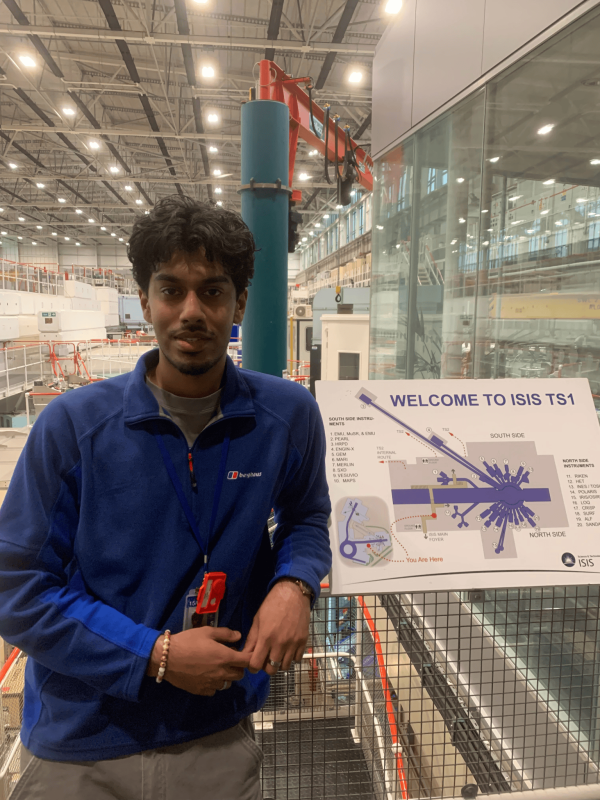
Talha N.
Student - Chemistry MChem
"The best thing about my course is the opportunity to apply and transfer the theoretical background of what we learn in our lectures to the laboratory every week. The skills we learn in the laboratory alone are incredibly useful as we learn not only skills for chemistry, but also professional development skills like teamwork, data analysis and more."


Deborah Brako-Amoafo
Student - Chemistry BSc (Hons)
"The lecturers go above and beyond for students. There is an open office policy, which enables students to contact teaching staff at any time. This availability and readiness to support students is impressive."
Learn more about the qualifications we typically accept to study this course at Surrey.
Typical offer
- BSc (Hons):
- BBB
- Required subjects: chemistry and a second science subject.
- MChem:
- AAB-ABB
- Required subjects: chemistry and a second science subject.
- BSc (Hons) with Foundation Year:
- CCC
- Required subjects: chemistry.
A-level General Studies and A-level Critical Thinking are not accepted. Applicants taking the Science Practical Endorsement are expected to pass.
GCSE or equivalent: English Language at grade 4 (C) and Mathematics at grade 4 (C).
- BSc (Hons):
- DDM.
- MChem:
- DDD.
- BSc (Hons) with Foundation Year:
- MMM.
BTEC must be in a relevant subject.
GCSE or equivalent: English at grade 4 (C) and Mathematics at grade 4 (C).
- BSc (Hons):
- 32
- Required subjects: Chemistry HL5/SL6 and a second Science Subject HL5/SL6.
- MChem:
- 34 - 33
- Required subjects: Chemistry HL5/SL6 and a second Science Subject HL5/SL6.
- BSc (Hons) with Foundation Year:
- 29
- Required subjects: Chemistry HL4/SL6.
GCSE or equivalent: English A HL4/SL4 or English B HL5/SL6 and Mathematics (either course) HL4/SL4.
- BSc (Hons):
- 75%
- Required subjects: Chemistry 7.5 and a second science subject 7.5.
- MChem:
- 82% - 78%
- Required subjects: Chemistry 7.5 and a second science subject 7.5.
- BSc (Hons) with Foundation Year:
- For foundation year equivalencies please contact the Admissions team.
GCSE or equivalent: English Language (1/2) - 6 or English Language (3) - 7 and Mathematics - 6.
- BSc (Hons):
- QAA recognised Access to Higher Education Diploma with 45 level 3 credits overall including 27 at Distinction and 18 credits at Merit.
- Required subjects: Access to Higher Education modules must be in relevant subjects.
- MChem:
- QAA recognised Access to Higher Education Diploma with 45 level 3 credits overall including 39 at Distinction and 6 at Merit or 30 at Distinction and 15 credits at Merit.
- Required subjects: Access to Higher Education modules must be in relevant subjects.
- BSc (Hons) with Foundation Year:
- QAA recognised Access to Higher Education Diploma with 45 level 3 credits overall including 21 level 3 credits at Distinction, 3 level 3 credits at Merit and 21 level 3 credits at Pass.
- Required subjects: Access to Higher Education modules must be in relevant subjects.
GCSE or equivalent: English Language at grade 4 (C) and Mathematics at grade 4 (C) (or equivalent).
- BSc (Hons):
- ABBBB
- Required subjects: chemistry and a second science subject.
- MChem:
- AAABB-AABBB
- Required subjects: chemistry and a second science subject.
- BSc (Hons) with Foundation Year:
- BBBCC
- Required subjects: chemistry.
GCSE or equivalent: Scottish National 5 for English Language grade C and Mathematics grade C.
- BSc (Hons):
- BBB from a combination of the Advanced Skills Baccalaureate Wales and two A-levels.
- Required subjects: A-levels in chemistry and a second science subject.
- MChem:
- AAB-ABB from a combination of the Advanced Skills Baccalaureate Wales and two A-levels.
- Required subjects: A-levels in chemistry and a second science subject.
- BSc (Hons) with Foundation Year:
- CCC from a combination of the Advanced Skills Baccalaureate Wales and two A-levels.
- Required subjects: A-level in chemistry.
A-level General Studies and A-level Critical Thinking are not accepted. Applicants taking the Science Practical Endorsement are expected to pass.
GCSE or equivalent: English Language at grade 4 (C) and Mathematics at grade 4 (C) (or equivalent).
This route is only applicable to the MChem course.
Applicants taking the Extended Project Qualification (EPQ) will receive our standard A-level offer, plus an alternate offer of one A-level grade lower, subject to achieving an A grade in the EPQ. The one grade reduction will not apply to any required subjects.
This grade reduction will not combine with other grade reduction policies, such as contextual admissions policy or In2Surrey.
- BSc (Hons):
- Distinction overall, with a minimum of C in the Core Component.
- Required subjects: science
- MChem:
- Not applicable.
- BSc (Hons) with Foundation Year:
- Pass overall, with a minimum of D in the Core Component.
- Required subjects: science
GCSE or equivalent: English Language at grade 4 (C) and Mathematics at grade 4 (C) (or equivalent).
English language requirements
IELTS Academic: 6.0 overall with 5.5 in each element.
View the other English language qualifications that we accept.
If you do not currently meet the level required for your programme, we offer intensive pre-sessional English language courses, designed to take you to the level of English ability and skill required for your studies here.


International Foundation Year
If you are an international student and you don’t meet the entry requirements for this degree, we offer the International Foundation Year at the Surrey International Study Centre. Upon successful completion, you can progress to this degree course.
Selection process
We normally make offers in terms of grades.
If you are a suitable candidate you will be invited to an offer holder event. During your visit to the University you can find out more about the course and meet staff and students.
Recognition of prior learning
We recognise that many students enter their higher education course with valuable knowledge and skills developed through a range of professional, vocational and community contexts.
If this applies to you, the recognition of prior learning (RPL) process may allow you to join a course without the formal entry requirements or enter your course at a point appropriate to your previous learning and experience.
There are restrictions on RPL for some courses and fees may be payable for certain claims. Please see the code of practice for recognition of prior learning and prior credit: taught programmes (PDF) for further information.
Contextual offers
Did you know eligible students receive support through their application to Surrey, which could include a grade reduction on offer?
Fees
Explore UKCISA’s website for more information if you are unsure whether you are a UK or overseas student. View the list of fees for all undergraduate courses.
Payment schedule
- Students with Tuition Fee Loan: the Student Loans Company pay fees in line with their schedule.
- Students without a Tuition Fee Loan: pay their fees either in full at the beginning of the programme or in two instalments as follows:
- 50% payable 10 days after the invoice date (expected to be early October of each academic year)
- 50% in January of the same academic year.
The exact date(s) will be on invoices. Students on part-time programmes where fees are paid on a modular basis, cannot pay fees by instalment.
- Sponsored students: must provide us with valid sponsorship information that covers the period of study.
Professional training placement fees
Professional Training placement year fees are approximately 20% of the full-time fee for the academic year in which you undertake your placement.
Additional costs
Safety equipment and/or uniform: £20 – new students are required to purchase a lab coat, marker pen and lab book.
Scholarships and bursaries
Discover what scholarships and bursaries are available to support your studies.
Our award-winning Professional Training placement scheme gives you the chance to spend a year in industry, either in the UK or abroad.
We have thousands of placement providers to choose from, most of which offer pay. So, become one of our many students who have had their lives and career choices transformed.
Chemistry placements
Students on our BSc can complete one of our award-winning Professional Training placements. There is a compulsory Industrial Research Year for students on the MChem.
Placements help you gain management and leadership skills, allowing you to become confident in problem-solving and communication. This gives you a real advantage in pursuing whatever career you choose. Many companies hosting placements offer our students employment upon graduation.
Companies who participate
Companies that participate in our scheme include:
- AWE (Atomic Weapons Establishment)
- British Geological Survey
- Cefas
- GlaxoSmithKline
- Institute for Nuclear Research
- Intrinsiq Materials
- Jacobs Douwe Egberts PerkinElmer.
Placements overseas
You can also choose to take your Professional Training placement or Industrial Research Year with an organisation overseas. Students have worked at:
- Aalto in Finland
- Grace in Germany
- Hills Laboratories in New Zealand
- Institut Ruder Boskovic in Croatia
- La Sapienza in Rome
- LB Foster Rail Technologies in Canada
- Netherlands Forensic Institute.
Applying for placements
Students are generally not placed by the University. But we offer support and guidance throughout the process, with access to a vacancy site of placement opportunities.
Find out more about the application process.


Discover, develop and dive in
Find out how students at Surrey developed their skills in industry by undertaking a placement year.
Discover, develop and dive in
Find out how students at Surrey developed their skills in industry by undertaking a placement year.
Apply for your chosen course online through UCAS, with the following course and institution codes.
About the University of Surrey
Need more information?
Contact our Admissions team or talk to a current University of Surrey student online.
- BSc (Hons)View UCJ10F0001U
- BSc (Hons) with foundation yearView UCJ10F1008U
- BSc (Hons) with placementView UCJ10S0002U
- BSc (Hons) with foundation year and placementView UCJ10S0008U
- MChemView UCJ20F0001U
Terms and conditions
When you accept an offer to study at the University of Surrey, you are agreeing to follow our policies and procedures, student regulations, and terms and conditions.
We provide these terms and conditions in two stages:
- First when we make an offer.
- Second when students accept their offer and register to study with us (registration terms and conditions will vary depending on your course and academic year).
View our generic registration terms and conditions (PDF) for the 2024/25 academic year, as a guide on what to expect.
Disclaimer
This online prospectus has been published in advance of the academic year to which it applies.
Whilst we have done everything possible to ensure this information is accurate, some changes may happen between publishing and the start of the course.
It is important to check this website for any updates before you apply for a course with us. Read our full disclaimer.
